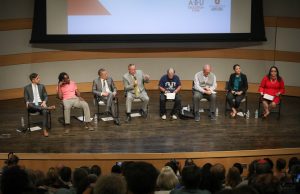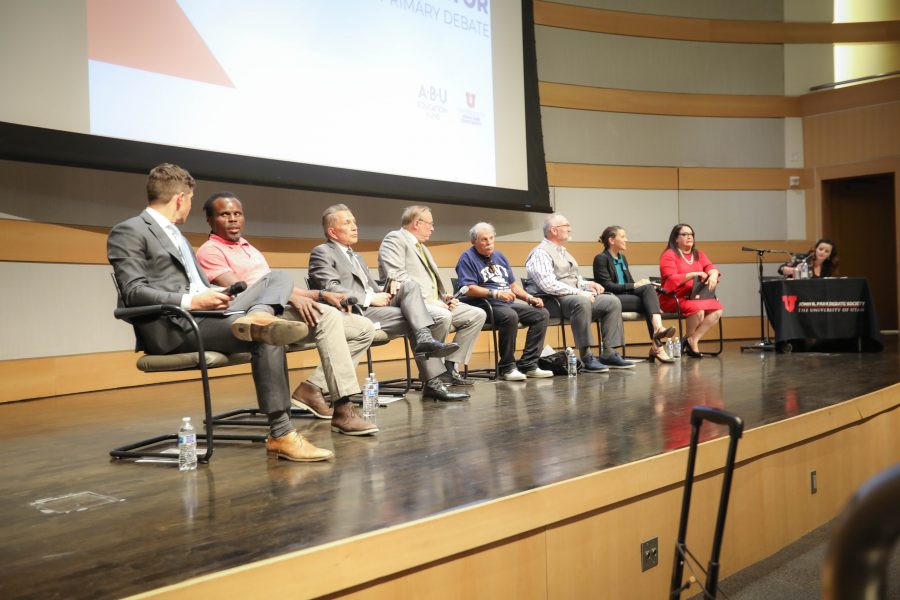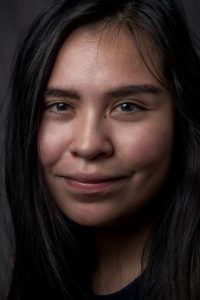Eight candidates appeared on June 26 on stage at the Salt Lake Public Library to highlight their vision and policies for Salt Lake if elected as mayor.
After the filing deadline earlier in June, the official candidates for the Salt Lake City mayoral race include Jim Dabakis, Luz Escamilla, David Garbett, Richard Goldberger, Rainer Huck, David Ibarra, Erin Mendenhall and Stan Penfold. They’re competing for the primary election, which will be held on Aug. 13, and will then be narrowed down to two candidates. The current mayor, Jackie Biskupski, announced she would not seek re-election, which sparked an energetic candidate field.
According to a poll by the debate’s co-host, Alliance for a Better Utah, Dabakis currently leads the candidate pool at 27%, with 34% of voters unsure. The margin of error is 4.5%.
In the beginning, candidates gave a recap of their vision for Salt Lake City and issues they believe were unique to its residents. Abi Olufeko stood in place on behalf of Huck due to health issues that evening, according to an ABU representative.
Many gave background information for their decision to run. Mendenhall brought up her infant son’s health, commenting that his struggles with the city’s air pollution compelled her to serve as a councilwoman for Salt Lake and address the matter through policy. “My first instinct was to walk away and find a place where my family could breathe clean air,” she said. “But I didn’t walk away — I decided to stay and get to work.”
Former Sen. Dabakis noted his beginning roots in radio, learning the ropes of the business and that throughout life, “I worked, I learned how to read spreadsheets, and we sold the radio station with me as a partner,” he said.
One of the questions was about homelessness — with plenty of ideological wrangling on how to curb the matter. Several years ago, Salt Lake City was viewed as a blueprint for metropolitan areas to tackle this and similar problems. Yet according to a December report by the Department of Housing and Urban Development, homelessness is growing. “A city of 200,000 doing the work of the state of 3 million is going to create challenges,” Garbett said.
Sen. Escamilla cited that the population of chronic homelessness, defined as an individual with a mental or health condition who has been homeless for more than a year, is around 10% in the city. Looking at the homeless policies installed in Austin, Texas, which cut down its rate, she “would like to see some of those replicated here.” Escamilla added the value of connecting individuals facing chronic homelessness “with social workers and make sure Medicaid expansion is there for them.”

Goldberger, an alumnus from the University of Utah, looked at Arizona and their tent city as a case study. This example, which received vocal disapproval from the audience, raised controversy on the treatment of the city’s inmates by the Maricopa County Sheriff. “The term homeless equates to the public, human garbage,” he said during his answer.
Ibarra launched off the first rebuttal by vocalizing his dismay to Goldberger’s statement. “We’re never going to be like that,” he said. “This is Salt Lake City, Utah.” Goldberger later clarified that it wasn’t his perception but the public’s on homelessness.
The standout issue addressed that evening was air quality through a series of ideas to ensure Salt Lake’s public health is protected but to also sustain its economic growth as well.
Garbett talked about how structural operations are to blame, proposing a rebuild of infrastructure in regards to transportation, since vehicles emit half of the carbon in the state. He promised that by 2024, Salt Lake would operate on 100% clean energy and therefore would be well prepared for the 2030 Winter Olympics if it were selected to host again.
Dabakis touted the benefits of offering free public transit, operated by TRAX, to encourage residents to have fewer cars and overall fewer emissions. “Imagine getting 30% of the cars off our streets,” he said. “Imagine how much money we would save when we’re not building those freeways.”
Penfold, who spearheaded the free-fare days for residents to use public transit, utilized it as an illustration of his championing for air quality and how establishing this commuting infrastructure encourages a sharp spike in ridership.
When briefed with the question on handling the Inland Port, all but two candidates, Huck and Golderberger, repeated their stance to continue litigation against the Inland Port Authority. The primary concerns with the issue are the lack of city representation on the authority board and potential environmental degradation.
At the end of the debate, candidates wrapped up with uniting in their promise to vitalize Salt Lake City through economy and opportunity, either through radical or incremental change.
The next primary debate was scheduled for July 14 and was the first to be televised for this race. This debate was hosted by the U’s John R. Park Society.




Sailor Bee • Jul 20, 2019 at 2:08 am
Escamilla and Dabakis are not the answer to answer to Salt Lake City’s needs . Both endorsed Jackie in the last election. One could proffer they observed Jackie’s problematic interpersonal issues when Jackie served in the Legislature a long side them; which have likely caused the high turnover rate of her mayoral staff. Still both Escamilla and Dabakis failed to warn voters.
Stan Penfold was executive director of United Way, president of the executive Directors of United Way, executive director of the Salt Lake City AIDS foundation(which case manages housing). He served two terms on Salt Lake City council during which time he chaired the committee. During his service he helped fund a first-of-it’s-kind social work case management program. Stan Penfold was on a regional committee with the National Network of Libraries of Medicine
Stan majored in Horticulture due to his great love for the environment. He is the best one to communicate with Republicans regarding the inland port as Stan was nominated by a Republican Governor to serve on Utah Userve even though Stan Penfold is a gay Democrat.
He has dedicated his life’s work to working on the complex problems of homelessness; more than any other candidate. Stan is the far better candidate to serve as Salt Lake City’s Mayor.